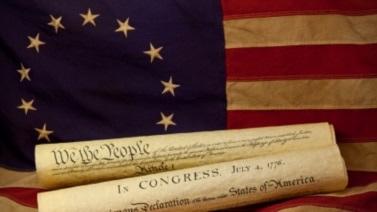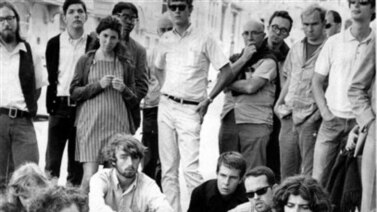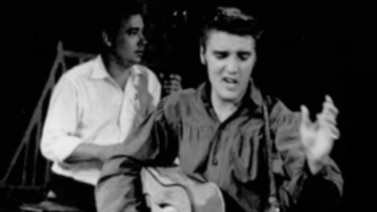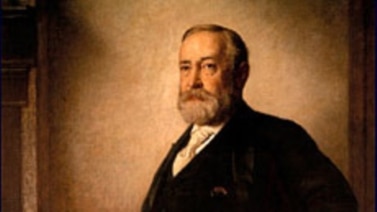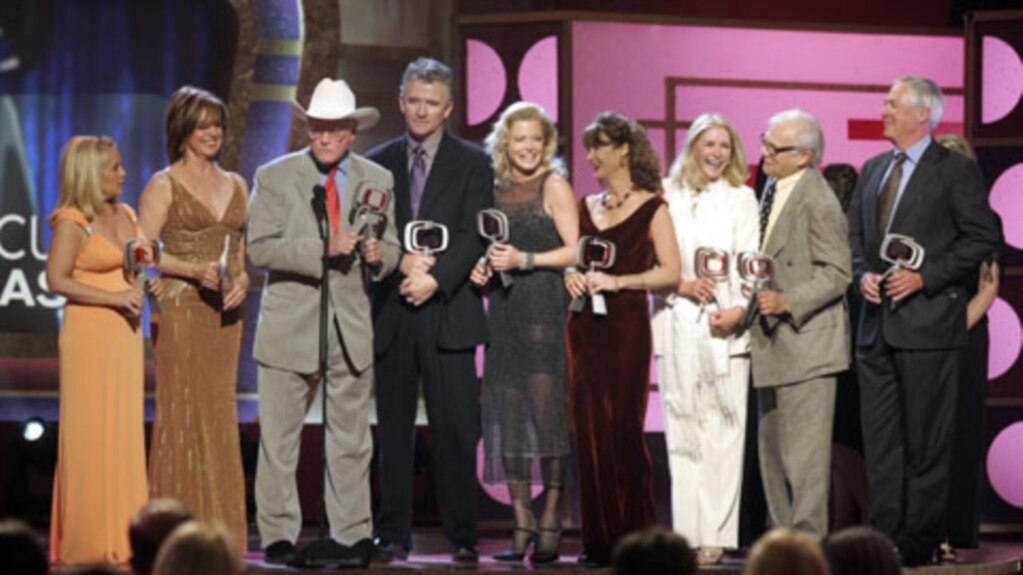
STEVE EMBER: Welcome to THE MAKING OF A NATION -- American history in VOA Special English. I'm Steve Ember.
This week in our series, we look back at some of the social issues and cultural changes in America in the nineteen seventies and eighties.
(MUSIC)
In some ways, the nineteen eighties seemed like the opposite of the nineteen sixties. The sixties were years of protest for social justice and change. Many Americans demonstrated against the Vietnam War. Blacks demonstrated for civil rights. Women demonstrated for equality. Many people welcomed new social programs created by the government.
By the nineteen eighties, however, many people seemed more concerned with themselves than with helping society. To them, success was measured mainly by how much money a person made. People wanted to live the good life, and that took money.
The changes started to become evident during the nineteen seventies. For a while, these years brought a continuation of the social experiments and struggles of the sixties.
But then people began to see signs of what society would be like in the eighties. There were a number of reasons for this change.
One reason was the end to America's military involvement in Vietnam after years of war. Another was the progress of civil rights activists and the women's movement toward many of their goals.
A third reason was the economy. During the nineteen seventies, the United States suffered a recession. Interest rates and inflation were high. A shortage of imported oil as a result of tensions in the Middle East only added to the problems.
As the nineteen seventies went on, many Americans became tired of economic struggle. They also became tired of social struggle. They had been working together for common interests. Now, many wanted to spend more time on their own interests.
This change appeared in many parts of society. It affected popular culture, education and politics.
ARCHIE BUNKER (CARROLL O'CONNOR): "Let me hear your idea again."
MICHAEL (ROB REINER): "OK, I want us to watch Jack Lemmon and a group of famous scientists discuss pollution and ecology on channel thirteen."
ARCHIE: "Good. And I wanna watch football highlights on channel two. Now guess what's gonna happen."
(MUSIC)
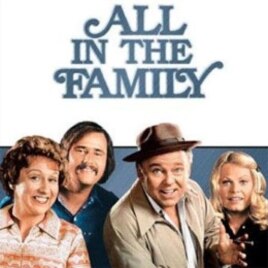
One of the most popular television programs of that time was a comedy series that often dealt with politics and serious social issues. The show was called "All in the Family." The family was led by a factory worker named Archie Bunker. Carroll O'Connor played Archie, and Jean Stapleton played his wife, Edith. The Bunkers lived in a working-class neighborhood in the Queens borough of New York City.
Archie represented the struggles of the blue-collar working man against the social changes in America. He loved his country and was socially conservative -- in the extreme.
ARCHIE: "What about John Wayne? And before you say anything, lemme warn you –- when you're talking about the Duke, you ain't just talking about an actor; you're talking about the spirit that made America great."
MICHAEL: "Are you kidding?"
His opinions on subjects like race and women's equality were always good for an argument with his liberal daughter and even more liberal son-in-law.
MICHAEL: "Good. I can mail my letter today and it'll get to Washington by Monday."
EDITH (JEAN STAPLETON): "Washington -- are you writing to Washington?
GLORIA (SALLY STRUTHERS): "That's right. Michael wrote the president."
ARCHIE: "Write to the president, about what?"
GLORIA: "All the things we've been talking about – the pollution of our air, the pollution of our water, the way us housewives have no protection from foods without nutrition, how they make products with harmful things in them. Like you saw what happened to Michael from that shirt."
ARCHIE: "You, Michael Stivic, Meathead, you have the nerve to write to the president of the United States about your rash?"
Edith would always try to make peace.
EDITH: "Maybe he knows a good skin man."[dermatologist]
(MUSIC: "Happy Days" theme)
Another popular program, "Happy Days," about family life in the nineteen fifties, offered an escape from the social issues of the day.
(MUSIC)
Music also changed. In the nineteen sixties, folk music was popular. Many of those folk songs were about social problems. But in the nineteen seventies, there was hard rock and punk.
TV HOST: "Here is Wonder Mike, Hank and Master G -- the Sugarhill Gang."
And in nineteen seventy-nine a group called the Sugarhill Gang brought rap music to national attention with a hit called "Rapper's Delight."
(MUSIC: "Rappers Delight")
In bookstores, the growing number of self-help books offered another sign of social change. These books advised people about ways to make themselves happier. One of the most popular self-help books was "I'm OK -- You're OK" by Thomas Harris. It was published in nineteen sixty-nine and led the way for many other popular psychology books throughout the seventies.
Politically, the United States went through several changes during the nineteen seventies. For most of the sixties the nation was governed by liberal Democratic administrations. Then in nineteen sixty-eight a conservative Republican, Richard Nixon, was elected president.
Nixon won a second term four years later, but had to resign in nineteen seventy-four because of the Watergate scandal. Nixon's vice president, Gerald Ford, took his place. Two years later, Ford was defeated by Jimmy Carter, a Democrat who until then was little known nationally.
The election showed that Americans were angry with the Republican Party because of Watergate. But they soon became unhappy with President Carter. They blamed him for failing to improve the economy and for failing to end a crisis involving American hostages in Iran. He lost his re-election campaign to Ronald Reagan.
RONALD REAGAN:
"Are you better off than you were four years ago?"
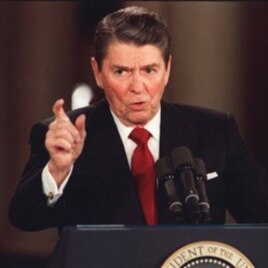
Reagan, a Republican, won two terms and led the nation during most of the nineteen eighties. For many people, the Reagan years offered a renewed sense of economic opportunity. Reagan reduced taxes, which increased his popularity. But the national debt grew as he raised military spending to put pressure on the Soviet Union.
The self-centeredness of many people in the seventies and eighties gave rise to terms like the "me" generation." And there was the rise of "yuppies" -- young urban professionals remaking older neighborhoods in cities, often displacing poorer people.
Popular entertainment at that time was often about financial success.
ANNOUNCER: "Premiering Sunday, April second, 'Dallas,' where money buys power and passion breeds conflict … "
(MUSIC: "Dallas" theme)
"Dallas" was a TV drama about a Texas oil family with more money, and more problems, than they knew what to do with. It became a hit not just in the United States but around the world. Actor Larry Hagman played J.R.
J.R. EWING (LARRY HAGMAN): "Your daddy lacked the killer instinct. He forgave those who transgressed against him. People just weren't afraid of him. And he overlooked ol' J.R.'s golden rules.
CASEY (ANDREW STEVENS): "And what might they be?"
J.R. EWING: "Don't forgive and don't forget. And do unto others, before they do unto you. And, most especially, keep your eye on your friends, 'cause your enemies will take care of themselves. Oh, and one other thing – the oil business is a little bit like a poker game. It's good to get caught bluffing early on, 'cause, after that, somebody's gonna call you when you've got a winning hand."
(MUSIC)
"Dynasty" was another popular series about rich people behaving badly. One of its stars was veteran actor John Forsythe.
BLAKE CARRINGTON (JOHN FORSYTHE): "Those banks are going to find out that they've got more than they can handle. Denver-Carrington [company] is Blake Carrington, and they'll come begging to me to run the company again. I know they will. And I'll make them get down on their knees when they come begging."
There was also "Lifestyles of the Rich and Famous," a series about real-life wealthy people, hosted by Robin Leach.
ROBIN LEACH: "Our bustling capital city combines the chic with the freak, the 'Oh, God' with the avant garde. So let's go 'upper deck' with a couple of my good friends, and run away with the rich and famous …"
And at the movie theater, there was the nineteen eighty-seven film "Wall Street."
GORDON GECKO (MICHAEL DOUGLAS): "The point is, ladies and gentlemen, that greed, for lack of a better word, is good. Greed is right. Greed works."
Michael Douglas played a character named Gordon Gecko, who earns his wealth by raiding companies and illegally trading on inside information.
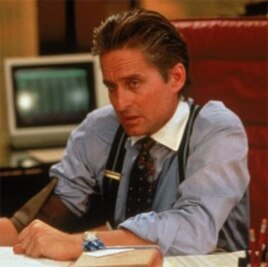
GORDON GECKO (MICHAEL DOUGLAS): "Greed clarifies, cuts through, and captures the essence of the evolutionary spirit. Greed, in all of its forms, greed for life, for money, for love, knowledge, has marked the upward surge of mankind. And greed – you mark my words, will not only save Teldar Paper, but that other malfunctioning corporation called the U.S.A. Thank you very much."[Applause]
Good triumphed over evil in the "Rambo" action films starring Sylvester Stallone. He played a troubled hero who had fought in Vietnam. The films were violent. But they represented a more positive view than society had shown in the past toward veterans of that unpopular war.
In the nineteen eighties people came to fear a new disease that could be spread by sex or blood. It was the rise of the AIDS epidemic.
At the same time a new drug -- crack cocaine -- started a wave of violence in American cities.
Technology was also on the rise.
ANNOUNCER: "You don't have to be a genius to use a computer. Let Computer Land show you how easy it is to manage your own small business or home finances with the Atari 800. Record keeping, information, communication, and a world of new ideas from Atari."
Personal computers appeared in more and more offices, schools and homes.
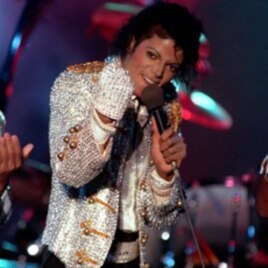
The nineteen eighties brought stardom to young entertainer Michael Jackson.
(MUSIC: "Beat It"/Michael Jackson)
And no history of the eighties would be complete without noting the rise of Music Television -- better known as MTV.
(MUSIC: "Money for Nothing"/Dire Straits)
You can find our series online with transcripts, MP3s, podcasts and pictures at voaspecialenglish.com. You can also follow us on Facebook and Twitter at VOA Learning English. I'm Steve Ember, inviting you to join us again next week for THE MAKING OF A NATION -- American history in VOA Special English.
__
Contributing: Jerilyn Watson
This was program #225. For earlier programs, type "Making of a Nation" in quotation marks in the search box at the top of the page.
Correction: The text has been changed to correct the author of "I'm OK -- You're OK." It was Dr. Thomas A. Harris, not Wayne Dyer.
